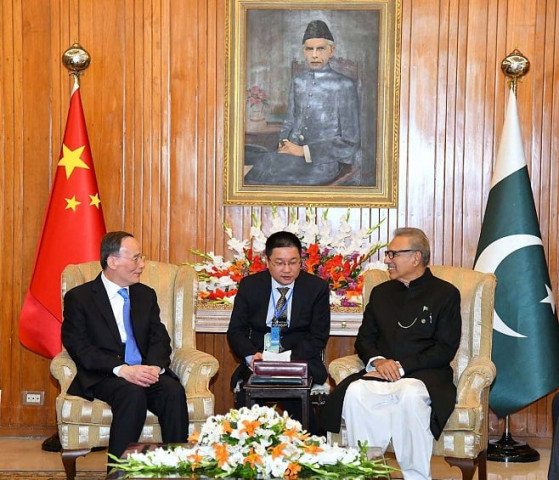China, Pakistan should jointly explore growth avenues’
Chinese VP hopes his country and Pakistan will continue cooperating with each other for peace and prosperity in region

Chinese Vice President Wang Qishan exchanging views with President Arif Alvi. PHOTO: APP
“The China-Pakistan Economic Corridor (CPEC) is a mutually beneficial project and it is fully supported by the people back in China,” he said at the ‘Friends of Silk Road’ seminar at the Pakistan-China Institute.
The Chinese vice president said both countries supported each other on all international issues. “We should work for humanity. China aims to evolve the human society. China is the second biggest economy in the world and we believe in supporting other countries to achieve economic stability,” he added.
Speaking on the occasion, Foreign Minister Shah Mehmood Qureshi appreciated China’s cooperation in the sectors of education, healthcare and industy.
He added that people-to-people cooperation would further build through the ‘Friends of Silk Road’ forum.
Pak-China Institute Chairman Mushahid Hussain Sayed noted that China’s poverty alleviation programme was a success.
“China wants to extend the scope of economic development to different continents through the Belt and Road Initiative,” he added.
“The first phase of the CPEC has completed successfully. All political parties firmly support the project.”
Senate Chairman Sadiq Sanjrani said China’s new Silk Road would pave way for a new era of progress and prosperity.
“The parliamentarians of both countries should also be in contact with each other,” he added.
The Belt and Road Initiative aims to reinvent the ancient Silk Road to connect Asia to Europe and Africa through massive investments in maritime, road and rail projects.
It offers to bring much-needed modern infrastructure to developing countries.
The BRI-induced Chinese outbound direct investment totals $80 billion. More than 80 special economic zones and high-tech industrial parks have either been built or are under construction, creating jobs and billions in extra tax revenue for host governments. Trade between
China and BRI partners is flourishing at a time when global trade faces uncertainties. Between 2013 and 2016, the value of China’s merchandise trade with BRI countries increased at a faster rate than China’s overall foreign trade.
China and BRI countries have launched more than 1,200 new international air routes and signed 18 transport facilitation agreements to improve the efficiency of commercial border-crossing. New trade routes are also being created.



















COMMENTS
Comments are moderated and generally will be posted if they are on-topic and not abusive.
For more information, please see our Comments FAQ